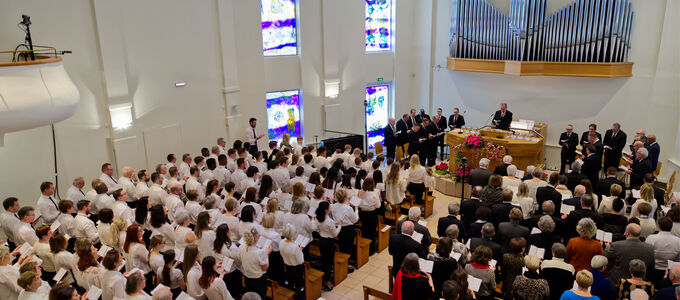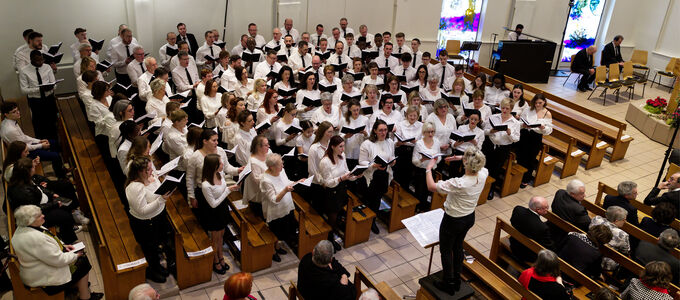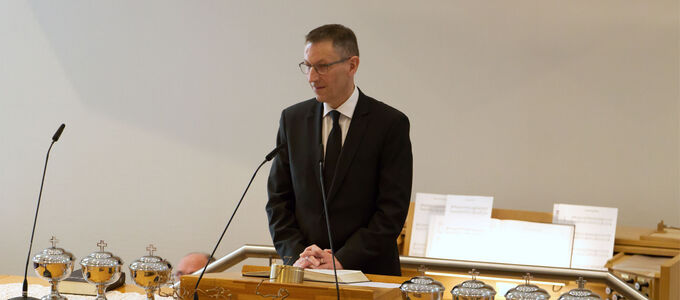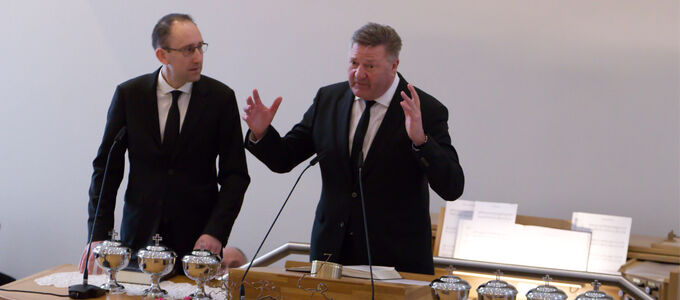
God is merciful and kind to us, which is why we too must be merciful. It is clear that we cannot become like God. But Jesus shows us the direction in which we must move.
“Our Bible text this morning is taken from the Sermon on the Plain. It is of fundamental importance for every Christian.” This is how Chief Apostle Jean-Luc Schneider started the divine service in Mulhouse in France on 11 February 2024. The passage was taken from Luke 6: 36: “Therefore be merciful, just as your Father also is merciful.”
God is merciful
“As human beings, we can experience this mercy and this mercy is described to us in the Bible,” the Chief Apostle said and listed the corresponding attributes of God.
- Leniency. With the parable of the prodigal son, “Jesus wanted to illustrate God’s mercy and forbearance: human beings separated from God as a result of original sin. They turned away from God, but He does not hold this against them. He continues to love them and continues to wait for them, and as soon as they come back to Him, He receives them with love and kindness and accepts them into His fellowship.”
- Compassion. “God is compassionate. He is sensitive to our material needs,” the Chief Apostle said, recalling how God clothed Adam and Eve after they fell into sin. But above all, God is merciful in times of spiritual distress: human beings were created by God to live in fellowship with Him. As soon as this fellowship is disturbed, the Chief Apostle said, something is wrong with us—even if we do not always notice it ourselves. “God wants to do something about this, which is why He sent His Son to earth.”
- Patience. “He maintains His offer of salvation,” the Chief Apostle said about God. “Throughout the time of grace that God grants us, He gives us time to repent so that He can once again show us His love, His goodness, and His closeness.”
- Forgiveness. The idea is not to punish sinners, but of making them repent. “If we do something wrong, God can forgive us our sins, meaning that this sin no longer affects our relationship with God.”
- Kindness. “He gives us everything a human being could ever receive: the glory of Jesus Christ, eternal fellowship with Him in His kingdom, and perfection. There is nothing more to be had.”
Jesus teaches mercy
“We cannot be as merciful as God is, not on same level,” the Chief Apostle made clear. But we can follow the example of Jesus and practise mercy as He did. “Mercy is more important than obeying rules and laws.” He went on to explain that Jesus’ example teaches and shows that those who are merciful will receive the grace to enter the kingdom of God.
We are merciful
Jesus’ example can teach us to practise mercy, the Chief Apostle said. He went on to explain how.
- Leniency. A first aspect is that we refrain from judgement, that we do not feel superior to others and assume that we are good and they are not so good. “We must accept others as they are, with their faults and imperfections, just as God accepts us with our faults and imperfections.”
- Forgiveness. “We must forgive because God forgives us,” the Chief Apostle said. “And we must forgive because it would do us no good if God were to punish the other person. Jesus gives us everything: glory, eternal happiness, as if we had triumphed on the same level as Jesus.”
- Compassion. We must show compassion, compassion for those living in poverty. We cannot solve all the problems in the world, but we can show compassion. “Help begins with a willingness to listen, to share in people’s distress, to cry with them, to pray for them, and to support them. And if something needs to be done for them, if concrete action is required, then we do it.” Compassion also means being able to look beyond our own interests to take into account other people’s interests. And finally, compassion for people’s spiritual distress also drives us to make sure that the Church can continue to fulfil its mission—by our getting involved, participating, and making sure that our grandchildren can still find salvation within the Church.
- Kindness. “Our wish to do good must not depend on the behaviour of others. It depends solely on our relationship with God. We are kind to others because God has been kind to us. We give because we have received a lot. This is not based on calculation or self-interest,” the Chief Apostle said. “Because if we start counting all that we have done, we are bound to be disappointed, and being kind to others will become an insurmountable and burdensome duty.”
- Patience. “We too must be patient,” the Chief Apostle said, reminding the congregation that the good things often do not even reach our neighbour and that many do not accept the redemption of the church. “Let us continue to pray for them. Even if it looks like it is pointless, let us be patient.” And we do not judge those who no longer attend divine services. “Let us continue to pray for them because we are convinced that this is what they need, that this is what they are missing. Let us continue to pray for them because prayer works.”




















